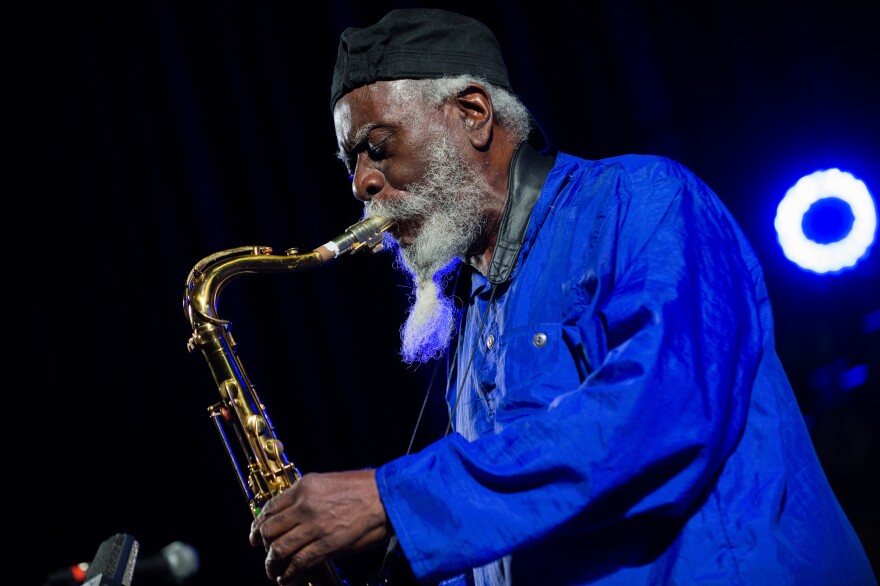Pharoah Sanders, the revered and influential tenor saxophonist who explored and extended the boundaries of his instrument, notably alongside John Coltrane in the 1960s, died on Saturday morning in Los Angeles. His death was announced in a post on social media by the record label Luaka Bop, which had released his celebrated 2021 album Promises and confirmed by a publicist who worked on the release. Sanders was 81 years old.
Spirit was the overwhelming force in Sanders' music: It emanated from his tenor and soprano saxophones in fiery blasts or a murmuring flicker, and it suffused his ensembles, which featured several generations of improvisers equally willing to dig in or soar free. "Sanders has consistently had bands that could not only create a lyrical near-mystical Afro-Eastern world," wrote one champion, the poet-critic Amiri Baraka, "but [also] sweat hot fire music in continuing display of the so-called 'energy music' of the '60s."
That combination of traits characterized Sanders' defining solo work of the '70s on Impulse! Records, which had been Coltrane's label home, and was still a welcoming harbor for experimentalism. Among these albums are Black Unity, consisting of one album-length improvisation, and Thembi, which nudges a post-Coltrane language into the realm of Afrocentric groove.
Sanders' single best-known piece of music is "The Creator Has a Master Plan," an expansive performance from 1969 that peaks in wailing cacophony but ends with a buoyant, soulful vocal refrain. Originally split across two sides of the 1969 LP Karma, the track was later issued on CD as a single track, nearly 33 minutes long.
Pharoah was born Ferrell Sanders on Oct. 13, 1940, in Little Rock, Ark. His love of music began at home, through his choir-leading grandfather. After high school — and a switch from the clarinet to the alto saxophone, before finally settling into the tenor sax — Sanders moved to the West Coast around 1959, attending Oakland Junior College, expanding his musical palette and pursuing the horizon, sitting in with avant-garde saxophonists like Sonny Simmons and Dewey Redman. While there, Sanders first met and befriended John Coltrane, though they wouldn't work together until many years later.
In 1961, Sanders relocated to New York, looking to join the city's fecund jazz scene, where Coltrane was a reigning figure. Sanders' landing in New York was rocky, however, resulting in intermittent homelessness as he practiced, sporadically, with Sun Ra and his Arkestra. (Sun Ra, it's said, was the one who encouraged him to take the name Pharoah.) Eventually, he was forced to pawn his horn.
Sanders' fortunes in New York slowly but surely turned around as he established a solo career, and by 1965 he was a member of what would be Coltrane's final quartet. Ascension, recorded in 1965 and released the following year, was a late-in-life turning point for Coltrane and, by extension, Sanders, who would become known for using his instrument in novel — anarchic and atonal — ways. Last year, Impulse! released the archival recording A Love Supreme: Live in Seattle, recorded a few months after Ascension; it features Sanders as a vital addition to Coltrane's quartet, expanding on his most heralded musical statement. (Live in Seattle, a separate album recorded during the same engagement, had long been a touchstone for an avant-garde left to forge the path ahead after Coltrane's death in '67.)
Even given his pioneering work, Sanders downplayed his technical achievements in favor of the emotional resonance he was seeking. "I'm not so much of a technical player myself," Sanders explained in a 1995 interview. "I'm probably not that much of an intellectual player, as some other musicians. What I do is... express. That's what I do."
Sanders' stature grew beyond the jazz avant-garde space as he became something of a spiritual elder, and his expressiveness survived in new contexts. In 2021, he released the album Promises in collaboration with the electronic musician Sam Shepherd, who records as Floating Points, and the London Symphony Orchestra that was widely and immediately hailed as one of the year's best. A patient and meditative album, it sometimes feels like a structure built for the sole purpose of allowing Sanders' voice and saxophone to levitate.
For many years, the jazz establishment lagged behind the African American community in appreciating Sanders' work, especially apart from his affiliation with Coltrane. But the power of his example and the sweep of his music helped set the framework for an ascendant class of artists like tenor saxophonists Kamasi Washington, James Brandon Lewis and Nubya Garcia, and multi-reedist Shabaka Hutchings.
"I find it difficult to regard Pharoah Sanders as an individual," wrote Hutchings in an appreciation of Black Unity for The Vinyl Factory. "I intuitively consider him as representational of a creative principle that centers communalism as the driving force from which spirit is manifested through sound."
Copyright 2022 NPR. To see more, visit https://www.npr.org.










